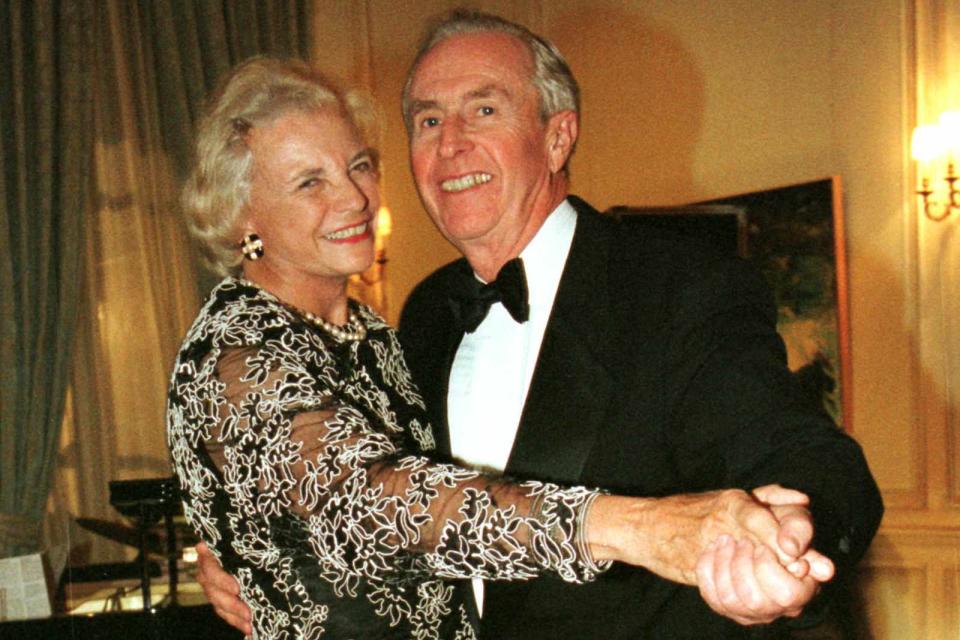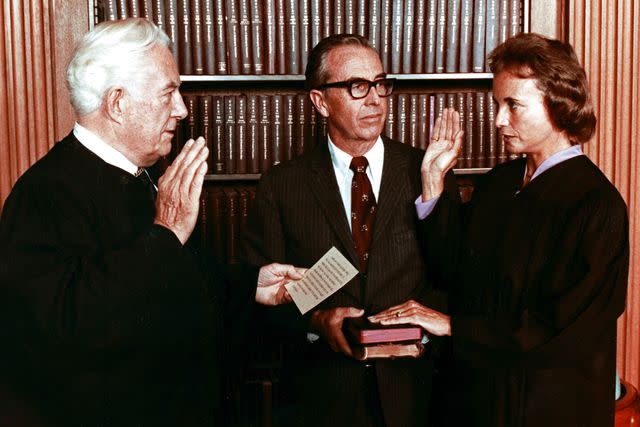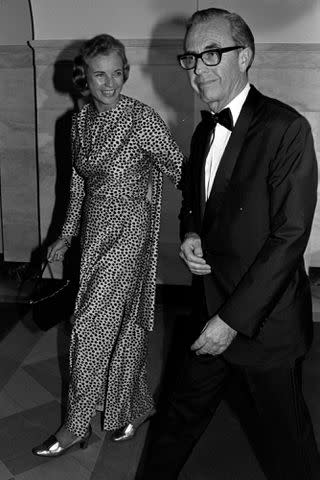Sandra Day O'Connor Spoke Passionately About Her Husband's Alzheimer's Journey Long Before Her Symptoms Began
The pioneering Supreme Court justice cared for her husband, John, for nearly two decades as his Alzheimer's progressed, receiving a dementia diagnosis of her own years after he died

Karin Cooper/Liaison/Getty
Justice Sandra Day o''Connor dances with husband JohnFormer Supreme Court Justice Sandra Day O'Connor's love story with her husband, John Jay O'Connor, was one touched by the strain of Alzheimer's — the disease that's believed to have taken both of their lives.
Sandra, appointed as the nation's first female Supreme Court justice in 1981, died in Phoenix, Arizona, on Friday morning at the age of 93.
The court announced her death in a statement, citing "complications related to advanced dementia, probably Alzheimer’s, and a respiratory illness." Alzheimer's was the same illness that took over her life in 1990, when her husband, John, was diagnosed.
Related: Justice Sandra Day O'Connor, First Woman to Sit on the Supreme Court, Dies at 93

Shutterstock
Sandra Day O'Connor is sworn in as an associate justice of the U.S. Supreme Court in 1981 alongside her husband, John O'ConnorSandra served on the Supreme Court for 25 years before retiring in 2006 to help John find a care center in Arizona. In remarks delivered before a Senate committee on aging two years later, she opened up about her experience as a caregiver.
"You may remember that in the early days of my husband’s illness, I often took him to court with me because he could not be left alone," Sandra said at the time. "Many caregivers make similarly difficult decisions each and every day. Sadly, these life-changing decisions are simply part of caring for someone with Alzheimer’s."
She continued: "Clearly, Alzheimer’s disease is a family disease. It may directly attack only one member of a family. But every member of that family feels the effects. Every member loses something."

Guy DeLort/WWD/Penske Media via Getty
In the advanced stage of John's disease, while he was staying at a care facility, he developed a relationship with another woman, as he no longer recognized his wife, according to a 2007 Phoenix television report.
John and Sandra's son, Scott O'Connor, said his mother was happy for her husband to be comfortable.
"Mom was thrilled that Dad was relaxed and happy and comfortable living here and wasn't complaining," Scott told KPNX-TV in an earlier interview, per The Arizona Republic.
In Sandra's 2008 remarks to the Senate, she explained, "Eventually, formerly self-reliant, articulate and loving family members lose the ability to bathe, dress or eat without help ... lose the ability to communicate ... and fail to recognize the spouse or the children for whom they have cared so deeply for so many years."
John died one year later, at the age of 79.
Related: Pioneering Supreme Court Justice Sandra Day O'Connor Announces She Has Dementia

David Hume Kennerly/Getty
John Jay O'Connor and Sandra Day O'Connor at their Paradise Valley, Arizona, home circa 1981In October 2018, Sandra's family released a letter from the 24-year Supreme Court veteran announcing that she herself had been diagnosed with early signs of dementia — theorizing at the time that it was likely Alzheimer's — and was "no longer able to participate in public life."
"How fortunate I feel to be an American and to have been presented with the remarkable opportunities available to the citizens of our country," she wrote. "As a young cowgirl from the Arizona desert, I never could have imagined that one day I would become the first woman justice on the U.S. Supreme Court."
In a 2018 interview, Scott addressed his mom's health, saying, "We still connect really well with mom. She's in very good spirits. She recognizes family when they come to visit, she recognizes close friends when they come to visit."
Never miss a story — sign up for PEOPLE's free daily newsletter to stay up-to-date on the best of what PEOPLE has to offer.
Following Sandra's death, the Alzheimer's Association commended the legal pioneer for bringing awareness to Alzheimer's and other forms of dementia.
"Former Justice O'Connor played an important role in making Alzheimer's the national priority it is today," said Dr. Joanne Pike, the organization's president and CEO, in a statement. "Driven by her experience of caring for her husband as he battled Alzheimer's, she served as a member of the Alzheimer's Study Group in 2009, ensuring caregivers and those living with dementia were represented.
"Ms. O'Connor leaves behind a legacy as a transparent leader," Pike continued, "using her voice to inspire action and change for all those impacted by Alzheimer's and all other dementia."
For more People news, make sure to sign up for our newsletter!
Read the original article on People.


